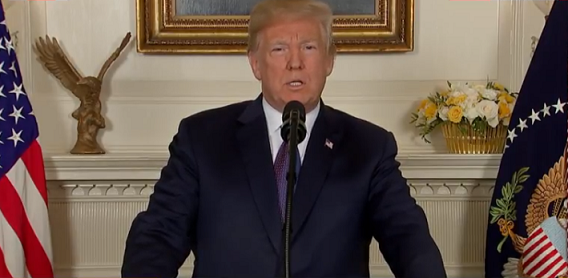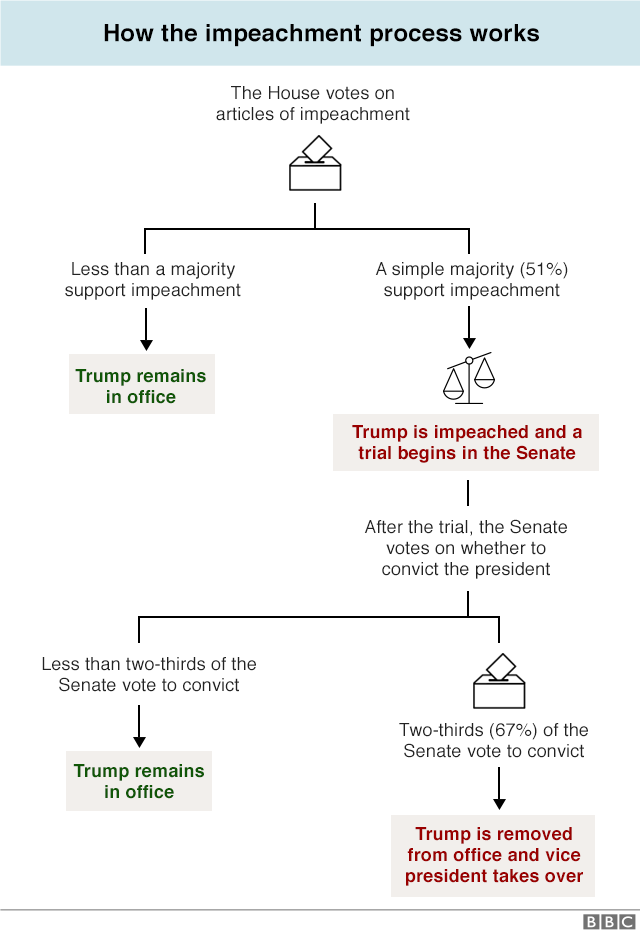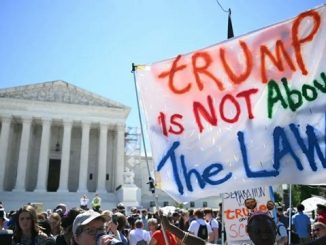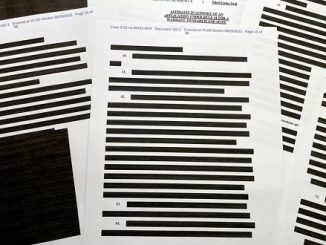
Donald Trump has become the third US president in history to be impeached by the House of Representatives, setting up a trial in the Senate that will decide whether he remains in office.
The House voted on two charges – that the president abused his power and that he had obstructed Congress.
Both votes fell along party lines with nearly all Democrats voting for the charges and all Republicans against.
As voting took place, President Trump was addressing a campaign rally.
He told the crowd in Battle Creek, Michigan: “While we’re creating jobs and fighting for Michigan, the radical left in Congress is consumed with envy and hatred and rage, you see what’s going on.”
The proceedings on Wednesday began with members of Mr Trump’s Republican Party calling for votes on procedural issues in an effort to frustrate the process.
That was followed by a vote on the rules to be set out for the impeachment, which kicked off six hours of partisan debate on the merits of the two impeachment charges against President Trump.
At about 20:30 local time (01:30 GMT), the House called for votes on the two charges: first, abuse of power, stemming from Mr Trump’s alleged attempt to pressure Ukraine to announce investigations into his Democratic political rival, Joe Biden; and second, obstruction of Congress, because the president allegedly refused to co-operate with the impeachment inquiry, withholding documentary evidence and barring his key aides from giving evidence.
The vote on the first article meant Mr Trump had been impeached, placing him alongside only two other presidents in the nation’s history – Andrew Johnson and Bill Clinton – and setting up a trial in the Senate for his presidency.
During the House debates, Mr Trump tweeted several times, calling the Democratic arguments “ATROCIOUS LIES BY THE RADICAL LEFT” and an “ASSAULT ON THE REPUBLICAN PARTY!!!!”.
The Republican Party has a majority in the Senate, making it highly unlikely the president will be removed from office when senators cast their votes. Republican Senate Leader Mitch McConnell last week said that Republican senators would act in “total co-ordination” with the president’s team during the trial, outraging Democrats who pointed out that Senators are obliged to act as impartial jurors.
What did House members say?
Democratic House Speaker Nancy Pelosi opened the debate on Wednesday with a speech from the floor of the House.
“For centuries Americans have fought and died to defend democracy for the people, but very sadly now our founder’s vision of a republic is under threat from actions from the White House,” she said,
“If we do not act now, we would be derelict in our duty. It is tragic that the president’s reckless actions make impeachment necessary. He gave us no choice.”
Democratic representative Joe Kennedy, a grand-nephew of President John F Kennedy, used his speech to address his children directly, explaining his decision to vote for impeachment.
“Dear Ellie and James: This is a moment that you’ll read about in your history books,” the Massachusetts congressman said, going on to accuse the president of “using his power as a weapon against his own people”.
Doug Collins, the top Republican on the House Judiciary Committee, accused Democrats of conducting an unfair and illegitimate inquiry.
“This is an impeachment based on presumption. This is a poll-tested impeachment about what actually sells to the American people,” Mr Collins said.
Republican Barry Loudermilk compared the impeachment process to the fate of Jesus Christ. “During that sham trial, Pontius Pilate afforded more rights to Jesus than Democrats have afforded this president in this process,” Mr Loudermilk said.
Democrats were reportedly instructed by Ms Pelosi to treat the process solemnly. She told reporters outside the chamber she was “sad” about the proceedings, and a number of Democrats reflected on their disappointment at being involved in impeachment proceedings.
Across the country in the 24 hours leading up to the vote, pro-impeachment protesters took to the streets. Hundreds of people gathered in Times Square in New York on Tuesday night, chanting: “Tell me who’s above the law? Nobody is above the law!”
The president had made an extraordinary intervention on the eve of Wednesday’s vote, penning an irate six-page letter to Ms Pelosi accusing her of declaring “open war on American democracy”.
In the letter, which was published by the White House, the president claimed he had been “deprived of basic Constitutional Due Process from the beginning of this impeachment scam”. He was in fact publicly invited by the Democratic chair of the House Judiciary Committee to give evidence, a move that would also have allowed his legal team to question witnesses, but he declined.


A day of hyper-partisanship

And so it is done. Donald Trump now becomes the third member of the exclusive club that no-one wants to be a member of.
But the framers of the constitution with its impeachment provision could never have imagined the hyper-partisanship – on both sides – that has been witnessed during today’s sterile House proceedings. Each side with its own narrative, neither side listening to the other. And one can say with some certainty – I would bet all my yet-to-be-gifted Christmas presents – that it will be much the same once this becomes a trial in the Senate in the New Year.
Donald Trump will be acquitted. He won’t be forced from office. So what changes? Well, Donald Trump will have a place in the history books – and for a man with such a huge sense of self that will hurt. Acutely. But 2020? Far from this being a killer blow against President Trump, it might turbo charge his bid for a second term. The House Speaker Nancy Pelosi was always wary about going down the impeachment route. We’ll discover next November whether that concern was well founded.
Source: bbc.co.uk






Be the first to comment